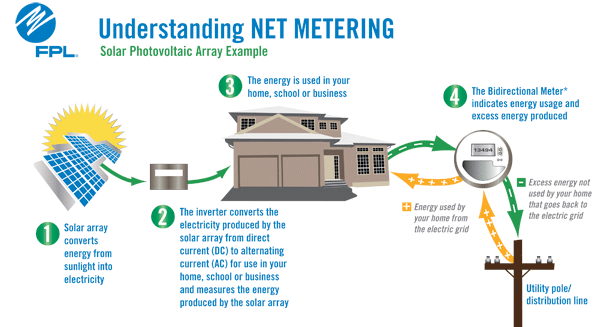Floridians want the solar industry to continue to grow in the “Sunshine State.” In fact, an overwhelming amount of Floridians want owners of solar-powered homes, schools, and businesses to continue to receive credit for the energy their solar systems add to the grid, without the threat of utility companies imposing unnecessary fees.
These statements are backed by a recent survey that revealed that 77% of Floridians support net metering for rooftop solar systems.
For those of you who may not be familiar with the term, “net metering” refers to the billing process associated with the give and take of grid-tied energy between owners of solar systems and their utility company.
States with favorable net-metering policies in place, like Florida, allow owners of rooftop solar systems to utilize a special bi-directional meter that correctly measures how much energy their solar system supplies to the grid, ultimately ensuring their net impact (give versus take) is appropriately calculated and reflected on their utility bills.
Here’s how it works: As a rooftop solar system produces energy, it will use this energy to power the home, school, or business it is affixed to. During times when the solar system produces more energy than needed – oftentimes during sunny daytime hours – the surplus of energy will flow to the utility company where it will be banked. At the end of each month, the electricity bill for the home, school, or business will reflect the difference between the energy banked and the energy consumed. The graphic below by Florida Power & Light illustrates this process further:
The benefits of net metering are numerous. And as the solar industry grows in Florida, it’s hard to overstate how important it is to keep this policy in place.
Not only does net metering mean significantly slashed electricity bills for those who choose to invest in solar power, it also provides a basis for the sustainability of solar power in the long term. The more home and business owners who understand and take advantage of net metering, the more the solar industry grows. The more the solar industry grows, the more the state and national job market grows.
Florida’s current net-metering policy is favorable among the state’s residents. In fact, the same survey revealed that 71% oppose utility companies placing a new fee on net-metered solar customers – a policy change that has been proposed by utility companies in other states.
These survey results are refreshing to us at LifeStyle Homes. Knowing that a majority of our fellow Floridians oppose threats to the growth of solar reinforces our commitment to building solar-powered homes. The time to take a stand for clean energy is now. Let’s keep it up, Florida!





